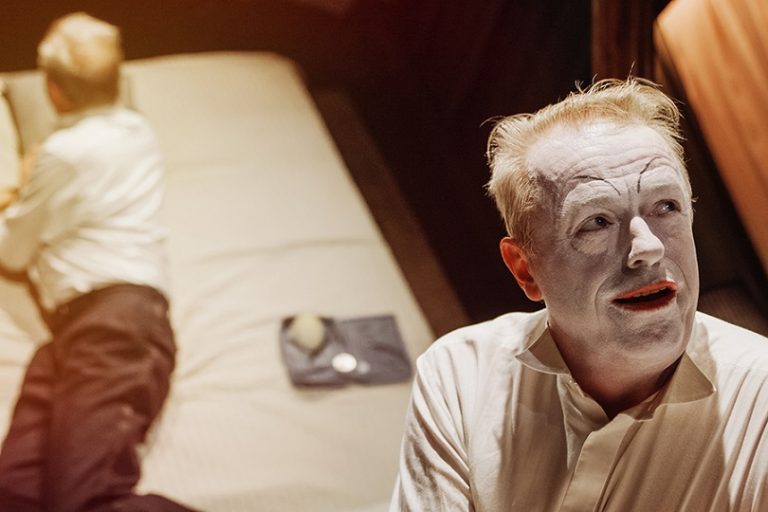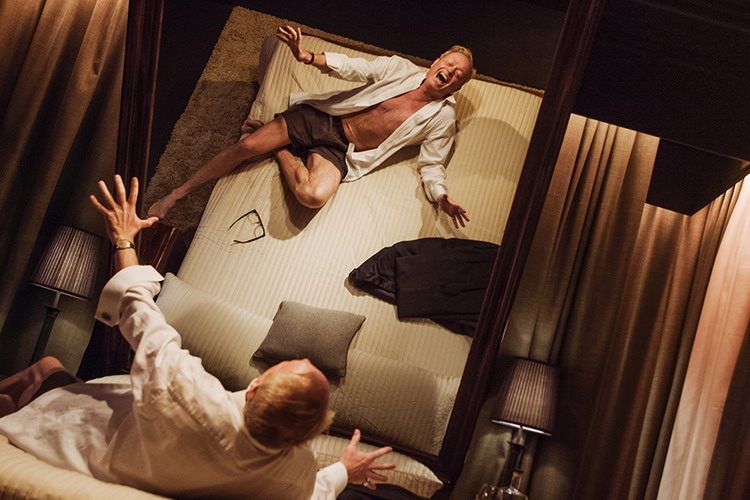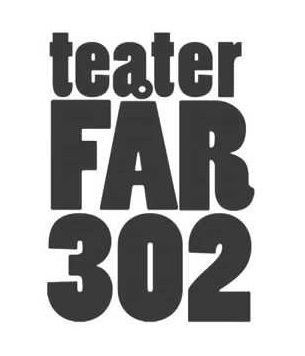
Theatre Får302 — the Smallest Intimate Stage of Copenhagen
By Tan Shuo
3
Pauli Ryberg lay on the bed in his pajamas, staring in the mirror ahead.
Director Kamilla Mortensen knew he had late-stage cancer and caringly installed a big mirror as part of the set at one end of the bed, so the audiences could see him from the reflection, in case he had to fulfill the performance in a lying position.
It was a scene from Sympathy for the Devil (Sympati For Djævelen), a new production of Theatre Får302 in the autumn of 2014 – just months after Pauli was diagnosed with pancreatic cancer. And by then, he had been receiving chemotherapy. Nevertheless, he still tried hard to be the same as a healthy person on stage.
Sympathy for the Devil was Pauli’s exclusive show. Lucas Svensson, author of the monologue, suggested him play the sole role as Gustaf Gründgens – one of the most influential figures in German theater in the 20th century and best remembered for his role as Mephisto in Faust.
Pauli saw it a real honor and promptly agreed after reading the text, which depicts the final hours of Gründgens in a hot hotel room in Manila in 1963 and his contentious argument about his collaboration with the Nazi regime as an artist.
Pauli as Gründgens lay on the bed alone, with a vial of sleeping pills in his hand…
He was physically fatigued after one and a half hours of performance. The chemotherapy pump, which delivered drugs into his bloodstream, was working in his trousers pocket. He could not live without it anymore.
And, he could not live without theatre, either. It was the passion for theatre that took him from Nakskov in Lolland to Odense Theater, and finally to the stage of Copenhagen. Since he became a member of Theatre Får302, he had taken the roles of over twenty plays.

Pauli’s memory flashed back. He remembered the first few years in the 2000s, when he, Charlotte Elizabeth Munksgaard and Birgitte Prins, aka “the ensemble of three different energies”, explored the themes of the fringe areas of Denmark (e.g. Dear God, Do Not Let Me Die on a Toilet / Kære Gud lad mig ikke dø på et lokum, 2004) as well as the rural-urban divide (e.g. Dreaming about the Good Life / Drømmen om det gode liv, 2005), and Pauli’s background as a son of Lolland was a rich source of inspiration. He even contributed the story of his parents to playwright Tomas Lagermand Lundme, and the latter made it into Dueslag (2006), “a true Danish folk comedy with modest undertones (En ægte dansk folkekomedie med beske undertoner)”,1 in which Pauli played both his father and uncle in Lolland dialect. Though less experimental and more realistic compared to the family dramas in the 1990s, all these plays had been revived in later years.
While The Sunfish (Klumpfisken, 2008), a love story between a marine biologist from Copenhagen and a fisherman from Hirtshals, won “the best little performance” of Reumert Prize in 2009, the ensemble of Theatre Får302 had been thinking to develop new directions. From the year 2010, they began to take a broader view and strengthen the ties with other theatres and artists from the Nordic region. The Dwarf (Dværgen, 2010), for example, was co-produced with Norwegian company VERK and directed by Icelandic Egill Pálsson with cast members from Norway, Sweden, and Finland. In 2012, Bastard – a Family Chronicle (Bastard – En familiesaga), a co-production at a much larger scale with Malmö City Theater, Rekjavik City Theater, and Icelandic Vesturport Theatre, was staged, and it was by then the biggest project ever in the history of Theatre Får302.
Pauli made eye contact with the audience in the mirror. He was so thankful for their coming to see the show, and he was so eager to let everyone know that the theatre was making impressive strides still. Sympathy for the Devil was revived in April 2016, and earlier that year, Pauli, Charlotte Elizabeth and Birgitte had accomplished Flowers, Feathers, Fishes & Snow (Sne, Blomster, Fjer & Fisk, 2016), a devised theatre production which marked a new breakthrough in their art.

As Charlotte Elizabeth puts it, “We are more and more interested in body on stage – how to express by our body instead of by words. We are going to the performance direction a little bit, rather than following written plays. Hence we can use our intuition and our heart more, questioning and showing different angles of the human conditions, and at the same time trying to avoid the cliché by going beneath it. Audiences can also relate to the questions, and what is very important, they don’t have to feel alone – don’t have to hide.”
“We don’t want to provoke audiences,” adds Birgitte, “but want them to be together and brace them.”
But Pauli could not see “Sheep” grow any more.
While audiences were gathering at Theatre Får302 and immersing themselves in the beauty of the new devised theatre piece Care (Omsorg, 2017), Pauli passed away. It was in the evening of 10 September 2017, and by noon the next day, almost all the major media in Denmark reported the news.
“In over twenty productions, Pauli Ryberg, as both actor and director, contributed to the great success of the small theater. And he reached the absolute highlight of his career in the role of the celebrated and frightening German actor Gustaf Gründgens,” writes Me Lund in the theatre’s press release.
“I think Pauli really live for the theatre,” Director Kamilla Mortensen comments, “He knew he was going to die of this cancer, but he just insisted on working…I think it kept him alive longer than the prognosis was. Pauli’s death is a significant loss to Danish theatre.”
And, undoubtedly, it is also a great loss to Theatre Får302. Birgitte, who joined the ensemble with Pauli in 2001, believes it was their three different characters that helped maintain the theatre’s experimental tendencies – at least in the last decade, but now she and Charlotte Elizabeth have to outsource new actors for each of their production.
“I miss Pauli so badly, very badly,” Charlotte Elizabeth sighs. If Pauli were alive, he would be 60 years old, just as she is. “I don’t know if we will close the theatre in 10 years when I am 70. Who knows? Who will take over the theatre? What will happen then? That will also be interesting.”
© TANTANYY
For Audiences, Artists, and Theatres
Related Articles:
Birgitte Hesselaa Talks About the Breakthrough in Modern Danish Drama
Theatre Får302 — the Smallest Intimate Stage of Copenhagen (part 1)
Theatre Får302 — the Smallest Intimate Stage of Copenhagen (part 2)
Theatre Får302 — the Smallest Intimate Stage of Copenhagen (part 4)
Notes and references:
1. Jyllands-Posten, “En ægte dansk folkekomedie med beske undertoner (a true Danish folk comedy with modest undertones)”, quoted in DUESLAG – To brødre og en kvindes kærlighed (DUESLAG – Two brothers and one woman’s love). Online Text. Retrieved from Teater Får 302, http://faar302.mickey.mico.dk/old/0607/dueslag.htm. Accessed 4 Apr. 2018.
The series of articles is fulfilled with support from Danish Arts Foundation and Theatre Får302.

